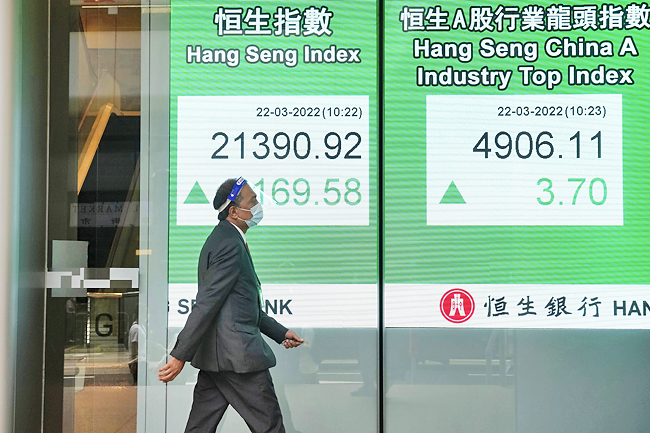TOKYO (AP) – Asian shares were higher yesterday as investors eyed the war in Ukraine and inflationary risks including rising energy costs.
Benchmarks rose in Japan, South Korea, Australia and China.
The Russian war on Ukraine and Western sanctions on Russia are adding to worries over disruptions to energy supplies for Europe and surging prices that might hinder progress toward economic recoveries from the pandemic.
“With no progress on peace talks, reports are circulating that the EU is setting the table for a Russian oil embargo. Higher energy prices will hugely harm the EU economy,” said managing partner at SPI Asset Management Stephen Innes.
Benchmark US crude added USD2.89 to USD115.01 a barrel yesterday in electronic trading on the New York Mercantile Exchange. Brent, the international standard, surged USD3.78 to USD119.40.
Japan’s benchmark Nikkei 225 surged 1.4 per cent to 27,202.05. Australia’s S&P/ASX 200 gained 0.9 per cent to 7,341.10. South Korea’s Kospi edged 0.8 per cent higher to 2,708.63.
Hong Kong’s Hang Seng rose 1.8 per cent to 21,606.53, while the Shanghai Composite recouped earlier losses to be up 0.3 per cent at 3,263.83.

Hong Kong-traded shares in e-commerce giant Alibaba Group jumped eight per cent after the company increased a share buyback to USD25 billion from USD15 billion yesterday to prop up a stock price that has fallen by more than half since the ruling Communist Party tightened control over tech industries by launching regulatory crackdowns.
Shares ended modestly lower on Monday on Wall Street after bouncing around for much of the day and bond yields rose sharply after Federal Reserve Chair Jerome Powell said the central bank was prepared to move more aggressively if need be to contain inflation.
The yield on the 10-year Treasury jumped to 2.30 per cent from 2.14 per cent late Friday.
The S&P 500 fell less than 0.1 per cent to 4,461.18, snapping a four-day winning streak for the benchmark index. The Dow dropped 0.6 per cent to 34,552.99 and the Nasdaq slid 0.4 per cent to 13,838.46.
Smaller company stocks fared worse than the broader market. The Russell 2000 index lost one per cent to 2,065.94.
In remarks at the National Association of Business Economists, Powell said the Fed would raise its benchmark short-term interest rate by a half-point at multiple Fed meetings, if necessary, to slow inflation. The Fed hasn’t raised its benchmark rate by a half-point since May 2000.
Last Wednesday, the central bank announced a quarter-point rate hike, its first interest rate increase since 2018. Stocks rallied after the announcement and went on to have their best week in more than a year. The central bank is expected to raise rates several more times this year.
Before Russia’s invasion of Ukraine added a new wave of global economic uncertainty to the mix, some Fed officials had said the central bank would do better to begin raising rates by a half-point in March.
Given rising risks of a recession, chief economist at ACY Securities Clifford Bennett said he believes the Fed should act cautiously.
“Europe will likely enter recession and with the world experiencing ongoing high energy and food prices, the poor will be disproportionately impacted. And raising interest rates will have zero impact on this war-driven inflation wave,” he said.


